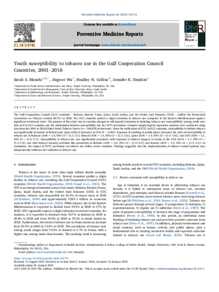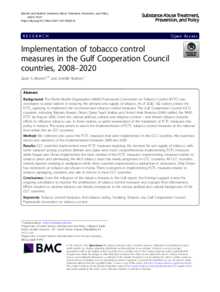وثيقة
Youth susceptibility to tobacco use in the Gulf cooperation council countries, 2001–2018.
المعرف
DOI: 10.1016/j.pmedr.2022.101711
المصدر
Preventive Medicine Reports. v. 26, 101711
المساهمون
الدولة
Netherlands.
مكان النشر
Amsterdam
الناشر
Elsevier Inc.
ميلادي
2022-04-01
اللغة
الأنجليزية
الملخص الإنجليزي
The Gulf Cooperation Council (GCC) countries – Bahrain, Kuwait, Oman, Qatar, Saudi Arabia, and the United Arab Emirates (UAE) – ratified the Framework Convention on Tobacco Control (FCTC) in 2006. Yet, GCC countries predict a slight reduction in tobacco use compared to the Eastern Mediterranean region's significant downward trend. The purpose of this study was to examine changes in self-reported intention to initiating tobacco use (susceptibility) among youth over time in five GCC countries and the relationship between susceptibility and key FCTC provisions. Complex sample logistic regression analyses were conducted using data from the 2001 to 2018 Global Youth Tobacco Survey (n = 349,878 adolescents). Since the ratification of FCTC in GCC countries, susceptibility to initiate tobacco use significantly decreased in Bahrain and Qatar while it increased in UAE (P 0.001). Exposure to smoking in public places increased the odds of susceptibility to tobacco use in Bahrain (AOR = 1.6, 95% CI = [1.2–2.2), Kuwait (AOR = 1.6, 95% CI = [1.2–2.0]), Qatar (AOR = 1.9, 95% CI = [1.4–2.6]), and UAE (AOR = 2.1, 95% CI = [1.6–2.7]). Susceptibility to tobacco use was significantly associated with exposure to tobacco imagery in media in the UAE (AOR = 1.7, 95% CI = [1.2–2.3]) and with tobacco industry activities like promotion in Bahrain (AOR = 2.8, 95% CI = [1.9–4.2]) and Kuwait (AOR = 2.2, 95% CI = [1.5–3.1]). In conclusion, the impact of FCTC provisions on tobacco use differs across countries.
ISSN
2211-3355
قالب العنصر
مقالات الدوريات


